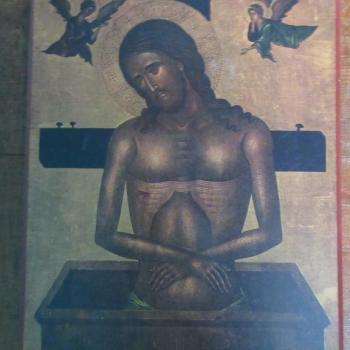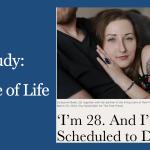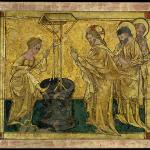
In a recent piece motivated by Why Catholicism Matters, Bill Keller identifies agreement: “Much as I wish I could encourage the disconnected Catholics of open minds and open hearts to stay put and fight the good fight, this is a lost cause. [Author Bill] Donahue is right. Summon your fortitude and just go”. The departure of Anne Rice from Catholicism, perhaps, could serve as a model: “I’m out. In the name of Christ, I refuse to be anti-gay. I refuse to be anti-feminist. I refuse to be anti-artificial birth control…”
At LifeSiteNews, a variety of reactions are posted to the Keller piece.
Dwarfing Catholic ecclesiology, for example, is Bruce Burgess who writes: “I wholeheartedly agree that those who disagrees with the Church’s teachings should leave the Church. If they won’t go voluntarily, they should be expelled.”
At the Second Vatican Council, in Lumen gentium, discovery is made of a “Church, to which we are all called in Jesus Christ, and in which we acquire sanctity through the grace of God, [that] will attain its full perfection only in the glory of heaven” (Paragraph 48). That Church, guided by the Holy Spirit, is moving toward greater realization of the expectations of God. While a person in the pew may indeed be mistaken about the capacity of the Church to develop its teachings in ways that would be agreeable to him or her, this mistake can be motivated by something true: The Church is moving towards a greater realization of the expectations of God.
If a person is taught to believe that communicated through his or her own conscience is, to quote John Henry Newman, the one “who, both in nature and in grace, speaks to us behind a veil”, then such a person will follow what he or she believes to be God. Because such persons believe that the Holy Spirit is leading the Church, it is quite typical – even if not correct – for that person to believe that there will be eventual correspondence between his or her conscience and the teachings of the Church.
The German Bishops have written that the Christian person “who believes that he has a right to his private opinion, or that he already knows what the Church will only come to grasp later, must ask himself in sober self-criticism whether he has the necessary depth and breadth of theological expertise to allow his private theory and practice to depart from the present doctrine of the ecclesiastical authorities.” While a person of conceit and presumption must stand before God, the German Bishops observe that some may, in fact, know what the Church will come to grasp later.
The Canadian Bishops, quoting Paragraph 50 of Lumen gentium, write that “cheerful readiness” is to be offered to what the Church communicates. The teachings of the Church, even further, are to be acknowledged with reverence and with the adherence of mind and will. The freedom of a person, after all, is not synonymous with the ability to do as he or she pleases. Turning to Humanae vitae, the Canadian Bishops counsel that Catholics examine honestly what Pope Paul VI has written. The Church, they remind, guides the human person in his or her pilgrimage toward final happiness.
The Canadian Bishops also observe that individuals who have tried sincerely, but without success, to keep the directives of the Church, may be assured that “whosoever honestly chooses that course of action which seems right to him does so in good conscience.” Such Canadian Catholics, finding Humanae vitae either “extremely difficult or even impossible to make their own”, should “not be considered or consider themselves, shut off from the body of the faithful.”
With respect to Bruce Burgess – that those who “disagree with the Church’s teachings should leave the Church [and that] if they won’t go voluntarily, they should be expelled” – the Church teaches differently. My question to Bruce surrounds why he has subordinated the teaching authority of the Church to Bill Donahue and Bill Keller. Another question I have surrounds how Bruce would experience my request (a request I do not make) that he leave the Church since he has dwarfed Catholic ecclesiology.
Also dwarfing Catholic ecclesiology is TCDU who writes that “most of those that don’t accept the Magisterium are already excommunicated automatically anyway.”
Such a claim subordinates the Code of Canon Law to one with which I am unfamiliar. Disagree with what the Church teaches about a particular matter – homosexuality, for example, or ordaining women – and, to TCDU, such a person has “already [been] excommunicated automatically”. I cannot locate the source of confusion in TCDU but it would not be unique to him or her. In a recent conversation with a priest, this issue of automatically incurring excommunication arose. I expressed my opinion that those moments were rather rare and the priest expressed his opinion that, given the prevalence of abortion, experiencing automatic excommunication is not that rare. The priest is wrong. Canon 1323 of the Code of Canon Law corrects him.
Several decades ago, the CDF revised the Profession of Faith which Canon Law requires some to profess. Unchanged was the first and longest paragraph but, after this first paragraph, three further ones were added. The first dealt with teachings divinely revealed and the second with teachings proposed definitively (teachings inseparably connected with the divinely revealed). The third paragraph dealt with teachings neither divinely revealed nor inseparably connected with that revelation. This third gradation had, as its interest, those teachings which emerge from the authoritative exercise of the teaching office of the Roman Pontiff or College of Bishops. Ecclesiologists use these added paragraphs as a framework for articulating gradations within Church teaching; for articulating the varying weights with which the Church teaches what it does.
In their commentary on Pope John Paul II’s Ad tuendam fidem, Joseph Ratzinger and Tarcisio Bertone distinguish between teachings connected to revelation by logical necessity and by historical necessity. Having the second gradation as their object of study in Paragraph 11 of their commentary, the duo assert that reserving priestly orders to men is a doctrine connected to revelation by logical necessity. Teachings connected by historical necessity, the duo interpret, include the legitimacy of a pontifical election or the canonization of a saint.
It is my opinion that as no solemnly defined official statement identifies what belongs to this second gradation, any proposed classifications must be considered interpretations. No less than Avery Dulles expresses his difficulty in understanding how, for example, the canonization of saints might fall within this gradation. Although taking issue with what Ratzinger and Bertone interpret as being connected to divine revelation by historical necessity, Dulles strangely accuses other theologians of “evasion” for claiming that another particular teaching – for example, reserving priestly orders to men – has not been definitively taught.
Even when the weight of Ordinatio sacerdotalis is combined with the consistent interpretation of the CDF, the most accurate statement which can be made is this: The Church interprets its teaching, on reserving priestly orders to men, as existing within the context of the second gradation. Given that such an interpretation is not protected by the infallibility of a solemn judgment, less clear is whether that interpretation is correct.
The interpretation of the CDF is communicated in their 28 October 1995 “Response to Dubium”: The reservation of priestly orders to men, the CDF states, has been infallibly taught by the Magisterium and is connected to the deposit of faith. Representatives of the CDF, at Vallombrosa, state that “the Magisterium has simply reaffirmed this teaching as a truth of the Church’s doctrine (the second paragraph), based on Scripture, attested to and applied in the uninterrupted Tradition, and taught by the ordinary and universal Magisterium, without declaring it to be a dogma that is divinely revealed.” Still further, to the German Bishops, John Paul II states that “the doctrine that the priesthood is reserved to men. It possesses, by virtue of the Church’s ordinary and universal Magisterium, that central character of infallibility which Lumen gentium speaks of and which I gave juridical form in the Moto Propio Ad Tuendam Fidem.” Neither the interpretations of the CDF, nor the words of the Pope, meet the criteria of a solemn judgment. While the Pope speaks authoritatively, his interpretation is not rendered infallible as a result. Persons following, then, should be very careful when leaving an accusation at the feet of another.
I wonder whether TCDU believes that a person is automatically excommunicated for being open to the possibility that, one day, a woman might be ordained a priest. The Church, certainly, does not say that such persons are excommunicated. Tasked to theologians is “assess[ing] accurately the authoritativeness of the interventions” by the Magisterium (Paragraph 24, Donum veritatis). If a theologian can come to a different conclusion about the authoritativeness of a teaching – such as the one reserving priestly orders to men – and if such a person has been able to do so without automatically incurring excommunication, then surely those less informed in the nuances of ecclesiological language can embrace the erroneous without having attributed to them the act of incurring excommunication.
A final dwarfing of Catholic ecclesiology comes in the words of Squire98: “It would be better if those RINO Catholics formally left the Church [editorial insert:Squire98 intends CINO. Please look past his or her Freudian slip.]. In practice they have already left. The Church would be cleansed of its pretenders and the pretenders would have their precious ‘independence’. Sounds like a win-win.”
Squire98, here, has reduced the Church not simply to its teaching authority but to its particular positioning on matters, in this case, related to human sexuality. The Second Vatican Council teaches of an existing hierarchy of truths which “vary in their relation to the fundamental Christian faith (Paragraph 11, Unitatis redintegratio).” It is not that some teachings matter and some do not but, rather, that the fundamental Christian faith is the God revealed in Jesus Christ. Being a Christian, to use the language of Pope Benedict, is found in encountering Christ. Being right about homosexuality, the ordination of women or artificial methods of regulating birth, is a separate matter.
Individual Catholics, instead of leaving the Church, should use the occasions of their disagreements to reflect upon the Church as the bride of Christ. Reflecting upon this image can be positive, I think, because it can remind persons of a self-giving love that exists between Jesus and the Church. It can remind such persons of the importance of the Eucharist; that central way in which such love is expressed. Anne Rice stated that she would miss participating in the Eucharist. Is that because, in those moments when Christ was mediated to herself and others, she experienced something of his transforming love?
Bruce Burgess, TCDU, and Squire98 would have a Catholic person distance him or herself from the Eucharist. The Church does not demand this. Bruce Burgess, TCDU, and Squire98, in dwarfing Catholic ecclesiology, have distorted Catholic thought. I will not make their mistake, however. I will not suggest they find a new environment in which their ideology might be better nurtured.















